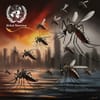Rising global temperatures are set to dramatically increase the range and seasonality of mosquito‑borne diseases, according to a new alert from the United Nations. As more regions warm and wet‑season windows extend, mosquitoes can survive and breed in places previously inhospitable — putting millions more people at risk of illnesses like malaria, dengue and Zika.
The UN report highlights how vulnerable populations — particularly in low‑income regions with weak health systems — may face the brunt of this shift. Countries that already struggle with disease infrastructure could see heavier burdens, with health facilities strained by outbreaks and costs spiralling as cases rise. The report stresses that adaptation and resilience measures are urgently needed if the global community hopes to manage the growing threat.
Beyond direct health care responses, the alert calls for cross‑sectoral action. That means integrating climate mitigation, disease surveillance, urban planning, and vector‑control initiatives together. For example, improved drainage systems, better housing, early warning systems, and community education can all help reduce mosquito‑breeding grounds and reduce exposure — even as weather patterns shift.
Finally, the UN emphasises that dealing with this emerging risk isn’t just a technical matter, but a justice issue. Those least responsible for climate change are often the most exposed. The article underlines the importance of funding and technology transfer — ensuring that affected nations can build resilient health systems and infrastructure.


